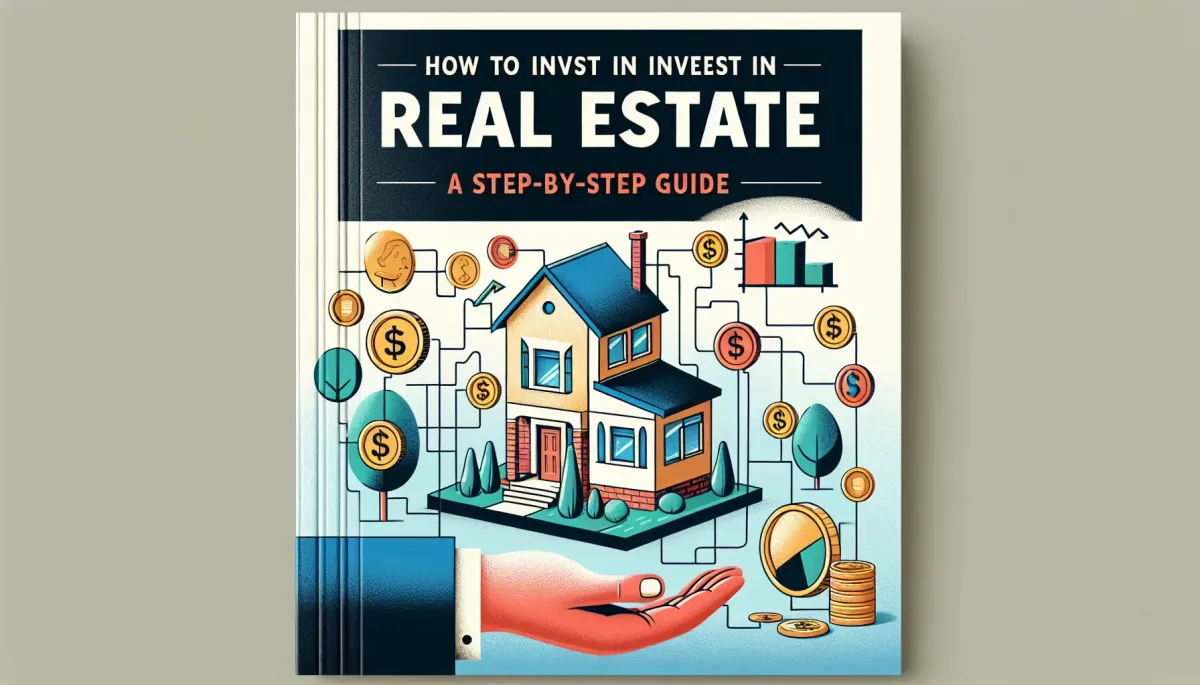Antoine Campbell's Blogs
Get valuable insights on different different aspects of the business.

How to Invest in Real Estate with No Money: A Step-by-Step Guide

Investing in real estate with no money may sound impossible, but it's actually achievable. Many people have found financial freedom and built wealth through real estate without having to spend a significant amount of their own money. By utilizing various strategies and options, individuals can enter the real estate market and start building their investment portfolio without a large upfront capital.
Leverage Other People's Money
Private or hard money lenders provide the funds for the investment, and the investor shares the profits with them.
Wholesaling
Investors find properties at a discounted price and assign the contract to another buyer for a fee.
Equity Partnerships
Investors form partnerships where one party provides the capital while the other brings expertise or property management skills.
Home Equity Loans
Using the equity in your own home to secure a loan for real estate investment.
Seller Financing
Buyers negotiate directly with the seller to arrange a financing agreement instead of going through traditional lenders.
Government Loans
Various government programs offer loans or grants for real estate investment, particularly for first-time homebuyers or low-income individuals.
Each strategy has its advantages and considerations, so it's essential to explore which option aligns best with your goals and circumstances.
Investing in real estate can lead to financial freedom and provide a pathway to building wealth. In this blog, we will delve into the various strategies and options available for investing in real estate with no money. We will discuss the benefits of real estate investment, how it can lead to financial freedom, and provide insights from industry experts.
If you're interested in exploring the world of real estate without breaking the bank, keep reading to discover the possibilities and potential for success.
Real Estate Investment Options
Real estate investment offers a variety of options for investors to explore. In this section, we will delve into some of the main options available and discuss their advantages, drawbacks, and examples of successful implementations.
Private Money Lenders
Private money lenders are individuals or organizations that provide funding for real estate investments. They offer an alternative to traditional lenders such as banks and credit unions. One of the main advantages of working with private money lenders is the flexibility they offer in terms of loan terms and approval processes. Unlike traditional lenders, private money lenders are often more willing to take risks and provide funding quickly.
For example, let's say you come across a great investment opportunity but need financing within a short timeframe. Private money lenders can be a valuable resource in such situations. They have the ability to evaluate the potential of the investment and provide funding in a matter of days, allowing you to seize the opportunity without missing out.
Some examples of private money lenders include companies like LendingHome and Patch of Land. These platforms connect real estate investors with private lenders who are ready to provide funding for their projects. By partnering with these lenders, investors can access the capital they need to pursue their real estate ventures.
Hard Money Lenders
Hard money lenders are another option for real estate investors, especially those who may not meet the strict requirements of traditional lenders. Unlike private money lenders, hard money lenders focus more on the collateral value of the property rather than the borrower's creditworthiness. This makes them a viable option for investors with less-than-perfect credit or a limited financial history.
It's important to understand that working with hard money lenders comes with both pros and cons. On the positive side, hard money lenders can provide quick access to funds, allowing investors to take advantage of time-sensitive opportunities. Additionally, they often have a streamlined application process, making it easier and faster to secure financing.
However, it's worth noting that hard money lenders typically charge higher interest rates and fees compared to traditional lenders. This is because they are taking on more risk by providing loans to borrowers who may not qualify for conventional financing. Therefore, it's essential to carefully evaluate the costs and potential returns of a project before deciding to work with a hard money lender.
Examples of hard money lenders include companies like Lima One Capital and Anchor Loans. These lenders specialize in providing short-term loans for real estate investments and can be a valuable resource for investors looking to fund their projects.
Wholesaling
Wholesaling is a strategy that allows investors to participate in real estate without using their own money. In a wholesale deal, an investor acts as a middleman, finding properties at a discounted price and assigning the contract to another buyer for a fee. This strategy can be a viable option for investors who may not have significant capital but have the ability to find and negotiate profitable deals.
The process of wholesaling involves identifying distressed or undervalued properties, negotiating with the seller to secure a purchase contract, and then finding a buyer who is willing to take over the contract. By assigning the contract, the wholesaler can earn a fee without having to invest their own funds.
However, it's important to be aware of the potential risks and rewards of wholesaling. On the one hand, wholesaling can provide a quick source of income and allow investors to build a network of buyers and sellers. On the other hand, it requires a keen understanding of the local market, strong negotiation skills, and the ability to accurately assess property values.
Successful wholesaling deals can result in significant profits, but it's crucial to thoroughly research and analyze each potential deal to ensure it aligns with your investment goals.
Understanding the various real estate investment options available is essential for investors looking to build wealth in the industry. Private money lenders and hard money lenders offer alternative financing options with their own set of advantages and considerations. Wholesaling provides an opportunity for investors to participate in real estate without using their own funds. By exploring these options and considering their benefits and drawbacks, investors can make informed decisions and increase their chances of success in the real estate market.
Investing in Real Estate with Little or No Money
Investing in real estate can seem daunting, especially if you have limited funds. However, there are strategies that can help you get started even if you have little or no money. In this section, we will explore some of these strategies and discuss how they can be utilized to invest in real estate effectively.
Purchase Money Mortgage/Seller Financing
One strategy that can help you invest in real estate with little or no money is through a purchase money mortgage or seller financing. This involves the seller of the property acting as the lender and financing the purchase for the buyer. This can be a win-win situation for both parties involved.
To obtain a purchase money mortgage, you would need to negotiate with the seller and agree on the terms and conditions of the loan. This can include the interest rate, repayment schedule, and any other specific terms that both parties agree upon. The benefits of this strategy include the ability to invest in real estate without needing a traditional mortgage or a large down payment.
For example, let's say you find a property that you are interested in purchasing but don't have the funds to do so. By approaching the seller and proposing a purchase money mortgage, you can secure the property without needing to come up with a large sum of money upfront. This can be especially beneficial for first-time investors or those with limited funds.
Investing in Real Estate through Lease Option
Another strategy to consider when investing with little money is the lease option strategy. This involves entering into a lease agreement with the option to purchase the property at a later date. This strategy allows you to control the property and potentially benefit from any appreciation in value during the lease period.
The lease option strategy has several advantages and considerations. One advantage is that it allows you to generate rental income while potentially building equity in the property. Additionally, it gives you the flexibility to decide whether or not to exercise the option to purchase based on market conditions or your financial situation.
For instance, let's say you find a property that you believe has the potential for appreciation but don't have the funds to purchase it outright. By entering into a lease option agreement, you can secure the property and start generating rental income. This can give you time to save up or secure financing to exercise the option to purchase in the future.
Forming Partnerships to Invest with Little Money
Forming partnerships is another strategy that can help you invest in real estate with little money. By pooling resources and expertise with other investors, you can leverage each other's strengths and overcome individual financial limitations.
Forming partnerships has its benefits and challenges. One benefit is that it allows you to access larger deals and diversify your real estate portfolio. Additionally, partnering with experienced investors can provide valuable insights and mentorship, increasing your chances of success.
For example, let's say you have limited funds but have identified a potentially lucrative real estate opportunity. By forming a partnership with another investor who has the necessary capital, you can collectively invest in the opportunity and share the risks and rewards.
Investing in real estate with little or no money is possible through various strategies. Whether it's utilizing purchase money mortgages, lease options, forming partnerships, or exploring government schemes and loans, there are options available to help you get started. It's essential to carefully consider each strategy's advantages, considerations, and potential risks before deciding which approach is best suited to your financial situation and investment goals.
Creative Financing Techniques in Real Estate
In the world of real estate investing, having access to capital is crucial for success. However, not everyone has the funds readily available to finance their real estate ventures. This is where creative financing techniques come into play. By thinking outside the box and utilizing alternative financing strategies, investors can overcome the obstacle of limited capital and still pursue profitable real estate opportunities.
Renting out Your Primary Residence
One of the creative financing techniques that can be employed is renting out your primary residence. This approach involves leasing your own home to tenants while you live elsewhere. By doing so, you can generate rental income that can be used to fund other real estate investments. This technique is especially beneficial for homeowners who have the flexibility to temporarily relocate or those who have multiple properties.
Advantages of Renting out Your Primary Residence
Provides a steady stream of rental income that can help cover your mortgage payments or even generate a profit.
Income can be used to finance other real estate investments, allowing you to expand your portfolio.
Allows you to leverage the property's value and equity, which can further enhance your purchasing power.
Considerations for Renting out Your Primary Residence
Comply with local laws and regulations governing rental properties.
Obtain any necessary permits or licenses.
Adhere to rental property safety standards.
Carefully screen potential tenants to minimize the risk of property damage or non-payment of rent.
Tips for Renting out Your Primary Residence
Ensure that the property is in good condition and attractive to potential tenants.
Make necessary repairs or improvements to maximize its rental potential.
Set a competitive rental price based on market rates.
Consider offering incentives to attract quality tenants.
Regularly communicate with your tenants and address any maintenance issues promptly to maintain a positive landlord-tenant relationship.
Other Creative Financing Techniques
Renting out your primary residence is just one example of the creative financing techniques available to real estate investors. Here are a few more:
Leveraging Home Equity
Using the equity in your current property to secure financing for additional real estate investments. This allows you to tap into the value you have built in your property and use it as collateral for a loan or line of credit. By doing so, you can access funds that can be used to purchase additional properties or fund renovations.
House Hacking
Purchasing a multi-unit property, such as a duplex or triplex, and living in one unit while renting out the others. The rental income generated from the additional units can help cover your mortgage payments or even generate a profit. This strategy allows you to live for free or significantly reduce your housing expenses while building equity in the property.
Each technique has its own advantages and considerations, and it's important to carefully evaluate which approach aligns with your financial goals and risk tolerance. By thinking outside the box and utilizing alternative financing strategies, investors can overcome the challenge of limited capital and unlock the potential for profitable real estate investments. So, explore these creative financing techniques and take your real estate investing journey to new heights.
Investing in Real Estate with No Money
Investing in real estate with no money may sound like a dream come true for many aspiring investors. After all, who wouldn't want to enter the lucrative world of real estate without having to spend a dime? However, like any investment strategy, there are pros and cons to consider. In this section, we will explore the advantages and disadvantages of investing in real estate with limited or no funds, as well as the potential risks and rewards.
Advantages of Investing with No Money
Leverage Other People's Money: One major advantage of investing in real estate with no money is the opportunity to leverage other people's money. This can be done through various strategies such as private money lenders, hard money lenders, and seller financing. By utilizing these financing options, investors can gain access to capital without having to put up their own funds. This allows them to acquire properties and start building their real estate portfolio even if they don't have significant savings.
Potential for High Returns: Another advantage of investing with limited funds is the potential for high returns. Real estate has historically been a profitable investment, and by leveraging other people's money, investors can amplify their potential profits. For example, if an investor acquires a property with no money down and the property appreciates in value, they can benefit from the full value appreciation without having to invest their own capital. This can result in significant returns on investment.
Disadvantages of Investing with No Money
Increased Level of Risk: One of the main disadvantages of investing in real estate with no money is the increased level of risk. When investors rely on other people's money, they may have less control over the investment and may be subject to the terms and conditions set by the lender or financing party. Additionally, if the real estate market experiences a downturn, investors who have borrowed heavily may be at a higher risk of financial loss.
Limitations and Options: Investing with limited funds may limit the options available to investors. Some financing options, such as private money lenders or seller financing, may come with higher interest rates or stricter terms. This can impact an investor's ability to negotiate favorable deals or access certain types of properties. It's important for investors to carefully consider the terms and conditions of any financing option before proceeding.
Successful Strategies with No Money
Despite the potential risks, there have been successful real estate investments made with little or no money. For example, some investors have achieved success through creative strategies like wholesaling or equity partnerships. Wholesaling involves finding properties at a discount and then assigning the contract to another buyer for a fee. Equity partnerships involve partnering with someone who has the capital to invest and sharing the profits.
In conclusion, investing in real estate with no money can be an attractive option for aspiring investors. It provides an opportunity to leverage other people's money and potentially achieve high returns. However, it's important to carefully consider the risks and limitations associated with this strategy. By understanding the advantages and disadvantages, investors can make informed decisions and pursue real estate investments that align with their financial goals and risk tolerance.
Investing in Real Estate with Little to No Money
Are you interested in investing in real estate but don't have a lot of money to start with? Don't worry, there are still options available to you. In this article, we will discuss various strategies and alternative methods for investing in real estate with little to no money.
Strategies for Investing with Little to No Money
Private Money Lenders: Private money lenders are individuals or companies that provide loans for real estate investments. They can be more flexible with their lending criteria compared to traditional banks.
Hard Money Lenders: Hard money lenders are similar to private money lenders, but they typically charge higher interest rates. They are a good option for short-term investments or fix-and-flip projects.
Wholesaling: Wholesaling involves finding properties at a discounted price and then selling them to other investors for a profit. It requires little to no upfront capital.
Equity Partnerships: Partnering with someone who has the capital can be a great way to invest in real estate without using your own money. You can split the profits based on each partner's contribution.
Government Loans: Some government programs offer loans with low or no down payment options for first-time homebuyers or real estate investors.
Alternative Methods for Investing with Little to No Money
House Hacking: House hacking involves living in one unit of a multi-unit property while renting out the other units. This can help cover your mortgage and other expenses.
Option to Buy: With an option to buy, you can secure the right to purchase a property at a predetermined price within a specific timeframe. This allows you to control the property without actually owning it.
Seller Financing: Seller financing involves the property seller acting as the lender and providing financing to the buyer. This can be a good option if traditional financing is not available.
If you're looking for more insights and resources on real estate investing and entrepreneurship, check out CEO929. CEO929 is a website dedicated to providing solutions and resources for entrepreneurs and business owners.
Antoine Campbell, the CEO of CEO929, shares his expertise through blogs and offers comprehensive solutions to help businesses succeed. One of their offerings is the Acquisition & Dispositions Workshop, a live virtual event that teaches participants how to close deals in real estate wholesaling. The workshop covers topics such as identifying profitable properties, negotiating deals, and selling to buyers.
CEO929 also provides paid products and services, including virtual wholesaling, automated lead generation, and expert virtual assistants. These resources can greatly benefit individuals interested in starting or establishing their own business.
To learn more about the resources and offerings from CEO929, visit their website at https://www.Ceo929.com . There, you can explore the various products and services available, as well as schedule a free strategy call with Antoine Campbell.
Remember, success in real estate investing and entrepreneurship is within reach, even with limited funds. Take advantage of the resources and expertise offered by CEO929 to make your business dreams a reality. So, what are you waiting for? Visit https://www.Ceo929.com now and start your journey towards financial independence and business success.

Apple Podcast

Spotify

Podcast Index

Amazon Music

Google Podcasts

iHeart Radio
© 2024 CEO929 All rights reserved. 3540 Crain Hwy, Bowie, MD 20716, United States Terms and Conditions | Privacy Policy





Instagram
Facebook
Youtube
Website
TikTok